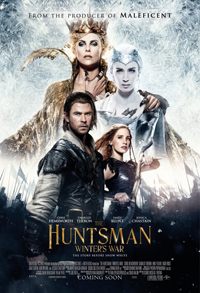Sister, My Sister: Love is a Much Belabored Thing in Fairy Tale Pre/Sequel
 While it certainly doesn’t reinvent the wheel (or, for that matter, capture a modicum of enthusiasm in its mishmash of formulaic fairy tale renderings), at least The Huntsman: Winter’s War takes the bungled parameters it established for Snow White in the prior 2012 outing and runs with it, evolving into a gawky creature neither prequel nor sequel. Instead, this glossy ganglion of tangents, helmed by visual effects supervisor Cedric Nicolas-Troyan (making his directorial debut) is something like the current state of evil Queen Ravenna, who muses she is neither alive nor dead, but something ‘in-between’ this time around. And this is exactly the terminology describing the film’s grim determination to slog through oddly juxtaposed dramatic scenarios, which isn’t quite silly enough to court camp or quite exciting enough to sustain interest. On the plus side, it’s perhaps one of the most female empowered studio properties to come along in quite some time, though its triumvirate of A-list ladies are all stuck playing lethargically conceived characters.
While it certainly doesn’t reinvent the wheel (or, for that matter, capture a modicum of enthusiasm in its mishmash of formulaic fairy tale renderings), at least The Huntsman: Winter’s War takes the bungled parameters it established for Snow White in the prior 2012 outing and runs with it, evolving into a gawky creature neither prequel nor sequel. Instead, this glossy ganglion of tangents, helmed by visual effects supervisor Cedric Nicolas-Troyan (making his directorial debut) is something like the current state of evil Queen Ravenna, who muses she is neither alive nor dead, but something ‘in-between’ this time around. And this is exactly the terminology describing the film’s grim determination to slog through oddly juxtaposed dramatic scenarios, which isn’t quite silly enough to court camp or quite exciting enough to sustain interest. On the plus side, it’s perhaps one of the most female empowered studio properties to come along in quite some time, though its triumvirate of A-list ladies are all stuck playing lethargically conceived characters.
Liam Neeson takes on the thankless role of omniscient narrator to unconvincingly implore there’s another side to the Snow White story we’ve never heard. We back up to glean the history of evil Queen Ravenna (Charlize Theron), the flawless step-mama of Kristen Stewart (who is not on hand for this sequel), and how she came to power by cheating diabolically over a game of chess. Next, she singlehandedly manipulates her passive sister Freya (Emily Blunt), who, due to a particularly atrocious case of spurned love, becomes an ice queen who stakes out her own kingdom in ‘the north’ and steals children to raise as an army of young adults not allowed to love while they defeat the surrounding unnamed regions in her honor. Two of her wards, Eric (Chris Hemsworth) and Sara (Jessica Chastain) fall in love, inciting her evil rage, thereby separated irrevocably. Fast forward seven years past the Ravenna/Snow White squabble, and it turns out Snow White (still off screen) is sickly and has sent her troops into the woods, tasked with securing the toxic mirror to some secret, remote location. But when the caravan suddenly disappears, brave rebel Eric is dispatched to assist so the mirror does not fall into Freya’s evil hands, who might use it to resurrect her dead sister, Ravenna.
Winter’s War resembles a variety of other recent popular fantasy films, its dueling witch/queen sister composites of power hungry mavens hailing from Narnia or Oz, and behaving in sensational extremes one wishes their cartoon counterparts in Frozen might have. Theron devours everything on screen as the haughty glamour puss Ravenna, commanding attention like nothing else in the narrative can. Upon her character’s reappearance, regurgitated in roiling golden swirls seeping out of the infamous bewitched mirror (irritatingly represented visually as a smeary shield apparatus) the film picks up an energy it had otherwise been completely lacking.
Blunt’s morose Freya, whose extreme protestations against the horrors of love courts titters with the over-the-top dialogue granted her in the screenplay from Evan Spiliotopoulos and Craig Mazin, recalls an equally simplified understanding of a woman’s drift to the dark side as relayed in Disney’s Maleficent. Except Blunt seems hardly suited for such an abridged character dealing with such complex emotions, inevitably paraphrased as pouty and foolish. Likewise, Jessica Chastain’s Sara (given an Irish brogue, though none of the other kidnapped children have such discernable accents), though commendably presented as holding her own with male love interest Hemsworth, is also victim to the screenplay’s manipulation of her character, equally denuded of any real depth. This is not to imply the male characters are equipped with anything less superficial, but proves feminism to be as equally futile when formulized into shapeless drivel. However, the repeated jokes at the expense of the female dwarves and their supposedly undesirable appearance seems a bit relentless and out of place. As the casting of the dwarves suggests (Nick Frost, Rob Brydon, Sheridan Smith, Alexandra Roach), they are meant merely to be superfluous comic relief. At least Willow (1988) cast actual little people.
You’ll be able to predict where all this ends up from a mile off, though the special effects team labors greatly through sequences featuring golden shapeshifting birds, porcelain magic owls regenerated as familiars, cascades of weaponized ice, fight sequences with tar-blooded goblins, and extreme close-ups on Hemsworth and Chastain’s courtship pantomime. Someone uses their last gasp to confirm how lucky Eric and Sara are to have one another, which only foretells doom for any preceding films forced to formulate a feature narrative revolving around this sinewy combative couple, who are about as romantically inclined as the medieval crime-fighting brother and sister duo from Hansel and Gretel: Witch Hunters (2013).
★★/☆☆☆☆☆


